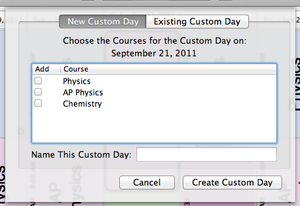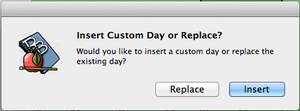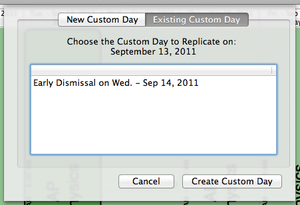Using Custom Days
While we'd love for our schedules to follow a predictable, repeatable pattern, we all know that sometimes schedules change. Planbook features the ability to create Custom Days to deal with assembly schedules, half days, and anything else your school can throw at you.
Contents |
Creating a Custom Day
To create a custom day in Planbook, you have two options
- Use the Schedule-->Convert To-->Custom Day menu item
- Use the Convert To Custom button found in the settings pane after clicking the gear in lower right corner of a lesson
Weekly Repeating and Same Thing Everyday Schedules
When you use a Weekly Repeating or Same Thing Everyday schedule in Planbook, your selected day is automatically converted to a custom day. Regardless of the method you use to convert a day into a custom day you'll have the option to select the courses that should meet on a custom day. You can also name your custom day to enable its easy reuse later in the year.Rotating and A/B Block Schedules
If you use a rotating or A/B block schedule, you might need to insert a custom day (shifting the rotation ahead without losing any days). Planbook enables this by asking you how to handle the new Custom day when you try and create it.
If you choose to insert your custom day, a new day will be inserted into your schedule and the day previously occupying that space in your calendar will be shifted ahead by one day. If you choose to replace, the day will be removed from your rotation. The screenshots below illustrate the impact of this choice.
Setting the Times for Lessons on Custom Days
Any new class that you add to a custom day will meet, by default, starting at the time you made the custom day and lasting for exactly one hour. This probably isn't what you want. To change the time for a lesson you'll want to:
- Bring up the settings pane in the right side sidebar by clicking on the small gear icon in the lower right corner of the lesson view.
- Modify the start and end time for your lesson using the text boxes. Planbook parses almost any time you enter; no need to enter 24 hour time anymore (but, you can if you'd like).
- Changes you make to the times for a custom lesson apply only to that lesson.
Reusing Custom Days
For custom days that occur frequently, Planbook 3.0 introduces a feature to allow the reuse of custom days. To reuse a custom day, go through the process of creating a custom day as described above.
Once you have the dialog box open asking you to select the courses for your new day, switch to the "Existing Custom Day" tab. You'll see a list all the custom days you've already entered. You can now select one of the days and apply it to custom day you're trying to make.
Planbook will list each of the named custom days you've already used (listing custom days used multiple times only once).
Planbook will do its best to retain existing lesson information on days designate to become custom. For example, if you've already planned a lesson in your Physics class but later convert the day to a custom day that includes a Physics lesson, the existing lesson will not be deleted and recreated. The information you've entered will remain.
Other Ways Custom Days Are Created
In addition to the manual mechanism for creating custom days described above, Planbook will sometimes convert a day to a custom day automatically based on changes that you make. Instances where a day will be automatically converted include:
- Adding a course to a single day
- Removing a course from a single day
- Changing the time for a single lesson on a day and not applying those changes throughout the file
- Adding a course to a specific day of the week (when using rotating schedules). For example, adding a homeroom class to every single Tuesday when your normal schedule is an A/B rotating schedule.
- Adding a course to a subset of the days in your schedule. For example, adding a course to all the days in September when your file continues into January






